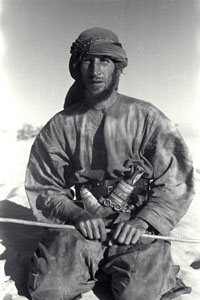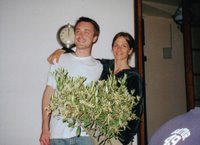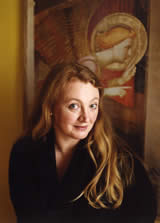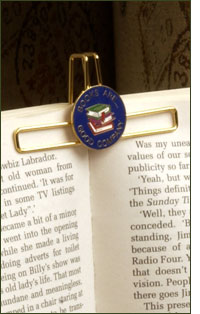The London Review of Books
Also in today's blog
Thesiger biography
Down with "Creative Writing"
Disconnecting in order to connect
The Venice of Périgord
Amanda Craig on an "incomprehensible absence"
Useful book clip
The Catalan friend and her English husband with whom we spent last weekend in the countryside near San Carlos de la Rápita had copies of the London Review of Books on which I fell with delight after a tiring day driving on busy main roads and through the centre of the city of Valencia whose streets I find less hair-raising than its long, hell for leather bypass.
Among the reviews in the LRB was one of a biography. Wilfred Thesiger : The Life of the Great Explorer by Alexander Maitland, published by HarperCollins in February at £25.
 The photo of the late Sir Wilfred Thesiger as he was in 1948 is borrowed from the Pitt Rivers Museum website where I learned that he is said to have taken 35,000 photographs during his explorations. The Maitland biography might be a suitable present for Mr Bookworm's birthday next month.
The photo of the late Sir Wilfred Thesiger as he was in 1948 is borrowed from the Pitt Rivers Museum website where I learned that he is said to have taken 35,000 photographs during his explorations. The Maitland biography might be a suitable present for Mr Bookworm's birthday next month. Down with Creative Writing
What struck me about the LRB was the large number of advertisements for Creative Writing courses. At "The UK's leading creative university", they offer an MA in Creative and Life Writing which takes one year for full-time students, two years for part-timers.
"Work with a range of published creative writers who give individual tuition and lead workshops." This is followed by a list of nine names, none of which I recognise.
Disconnecting to connect
Also advertising in the LRB is La Muse Writers' Retreat a short drive from the French walled city of Carcassone where Mr Bookworm and I once planned to stay at an hotel recommended by Ernest Hemingway as one of the most beautiful in the world. Why we didn't, I can't remember. Possibly because it was less beautiful than Hemingway claimed or had upped its prices beyond what we thought reasonable.
 La Muse, hosted by the Eielson-Fannings [seen left] describes it purpose thus -
La Muse, hosted by the Eielson-Fannings [seen left] describes it purpose thus - "Our mission is to provide a peaceful space where artists and writers can work in a peaceful, isolated and inspiring setting. We have hosted writers, artists, composers, and more. La Muse is a self-service establishment. The house is informal and comfortable, but a structure exists with the purpose of vigorous work and focus on a creative project. That structure consists of our house guidelines, which we ask each guest to consult before applying. Their purpose is to support a true retreat from life back home. We are as much a machine-free house as possible to enable you to clear your mental desktops and find peace and inspiration through discipline and some seclusion. The point is to disconnect in order to connect. The house is located in a secluded, very quiet village with no distractions, save people, nature and the good food you’re bound to enjoy in France. A stay here feels like a step back in time.
Usually, when travelling through France, Mr Bookworm and I stay at Logis de France. Of the three where we night-stopped last Sunday, Monday and Tuesday, the first served the worst food we've had in a long time. The third was OK but the location was disappointing.
 The second, the Hostellerie du Périgord Vert at Brantôme, a small town surrounded by water and known as the Venice of Périgord, was excellent. The proprietors, Gilles and Marielle Roby, a young couple with small children, have added a swimming pool since we last stayed there. The food they serve is delicious. Usually, when travelling, we set out early and have breakfast en route. But at the H du P V we had breakfast there with hot croissants, more of the excellent bread served at dinner the night before, and pots of home-made conserves, not those beastly little plastic containers of factory jam that some hoteliers provide.
The second, the Hostellerie du Périgord Vert at Brantôme, a small town surrounded by water and known as the Venice of Périgord, was excellent. The proprietors, Gilles and Marielle Roby, a young couple with small children, have added a swimming pool since we last stayed there. The food they serve is delicious. Usually, when travelling, we set out early and have breakfast en route. But at the H du P V we had breakfast there with hot croissants, more of the excellent bread served at dinner the night before, and pots of home-made conserves, not those beastly little plastic containers of factory jam that some hoteliers provide.Amanda Craig
Yesterday [Saturday] at lunch [fruit and yog with bread bought in St Malo on Wednesday and still delicious after being warmed in the oven] I read, in the books section of The Daily Telegraph, a review headed "Amanda Craig praises a subtle novel about the joys of old age Life begins at seventy." [ The book being Miss Webster and Chérif by Patricia Duncker.]
The review began "The absence of elderly heroes and heroines from the pages of modern literary fiction is incomprehensible. In real life, those over 70 have the best stories to tell, and the greatest liberty to experience or observe new things : yet if you believe novelists, nobody over the age of 40 has anything worthwhile to do or say."
 That paragraph sent me off in search of Amanda Craig whose journalism I've been enjoying for years but whose novels I have yet to sample. At her website I read her biography, then the text of a talk about being a novelist, then two articles, How I became a surrendered wife and Fighting back against yobs.
That paragraph sent me off in search of Amanda Craig whose journalism I've been enjoying for years but whose novels I have yet to sample. At her website I read her biography, then the text of a talk about being a novelist, then two articles, How I became a surrendered wife and Fighting back against yobs.There are many more pieces on her site I look forward to reading. I'm not sure if Craig is her maiden or married name but, when Amanda Craig was a child, her parents had a house in London where "one of their tenants was Fay Weldon, who was the first professional woman novelist I had come across, and the subject of intense fascination to me for years before we became friends."
I wonder what Ms Craig makes of Fay Weldon's appointment as Professor of Creative Writing at Brunel University? I should think she must have reservations about it because her own views on writing are as down-to-earth as my own.
For example, in her talk to the City of London Girls' School on The Business of Writing Fiction, she began
"I’m here today to tell you about being a novelist, and especially about being a woman novelist, but what I’m going to tell you isn’t about the romantic side – like discovering you love reading so much that you want to write books of your own. I’m going to tell you about the business of being a novelist, which is the nasty side."
She went on
"The favours market is easiest to spot. When you see those lists of Best Summer Books, or Books of the Year chosen by well-known authors, you should be very, very wary of believing what they say. The majority of the books enthusiastically recommended in these lists are by the author’s best friend, lover, protégée or patron. Usually, there is a quid pro quo: you’ve praised my book, so I’m going to praise yours. This is known as log-rolling. It’s a pretty harmless past-time - unless you happen to be a reader who forks out £16.99 for a bad book."
She continued
"The fear market is much more poisonous, and much less discussed. You may recognise it from your own experience of cliques and gangs in school. One author has annoyed another author – perhaps by giving him or her an unenthusiastic review, or simply by making an off-hand remark at a party. This earns them the enmity not just of the author, but of their clique. Very few novelists can survive without such a clique. Writing is such a high-risk business that any bad review can make the difference."
But perhaps her most telling point was
"At school, some of you may see each other as rivals. Outside, you are going to be in opposition to an entire sex, one that has co-operated and competed for thousands of years to stay on top. If you are interested in fiction, ask yourselves why, when so many girls are better at English from the moment they start speaking, so few ever win or even get short-listed for them – why four times more men win the Booker than women, ten times more win the Whitbread and twenty times more win prizes for journalism. Are men really so much better at writing than women?"
In case the quotes I've selected should give you the idea that Ms Craig is a feminist in the pejorative sense of the term, my impression is that her brand of feminism is much the same as my own.
Useful book clip
I wonder if any of you used to lunch at theGeneral Trading Company when it was in London's Sloane Street, before moving round the corner to Symons Street off the north-west corner of Sloane Square?
I preferred the old shop to the new one and had many interesting book-conversations with other people lunching alone in the basement restaurant which opened into a sunny courtyard. At one stage the restaurant had problems with respectable-looking thieves strolling through and snatching customers' bags. To prevent this, the management arranged for all the tables to have hooks fixed underneath them where bags would be safe.
Some months ago, in a Spanish restaurant, the owner presented the members of my expat book group with portable hooks which clip on the edge of the table. Most useful. I used it a lot while travelling last week.
I was reminded of the GTC and my portable clip when I went to a site called Serious Readers where you can buy a clip to hold books open for £7.99

On the Condor ferry from St Malo to St Peter Port last Wednesday evening, I had an interesting conversation with a Frenchman who had been using a GPS or global positioning system, a gadget new to me.
He told me he was escorting an aeroplane engine to Guernsey where, during the night, it would be fitted in a plane whose engine had failed.
